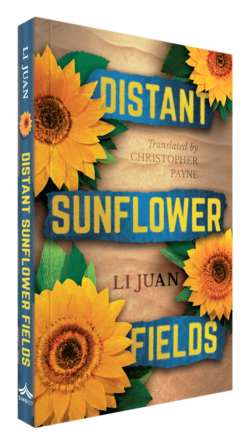Distant Sunflower Fields, by Li Juan
translated by Christopher Payne
Sinoist Books, 2021
Publisher's Blurb
An iron-willed mother, an ageing grandmother, a pair of mismatched dogs and 90 acres of less-than-ideal farmland: these are Li Juan’s companions on the steppes of the Gobi Desert. Writing out of a yurt under Xinjiang’s endless horizons, she documents her family’s quest to extract a bounty of sunflowers amid the harsh beauty and barren expanses of China’s northwest frontier. Success must be eked out in the face of life’s unnegotiable realities: sandstorms, locusts and death.
While this small tribe is held at the mercy of these headwinds, they discover the cheer and dignity hidden in each other. But will their ceaseless labours deliver blooming fields of green and yellow? Or will their dreams prove as distant as they are fragile?
Reading Chinese Network Reviews
Reviewed by Z.Z. Lehmberg, 17/12/21
 I first started writing this book review in early fall, when the ground was ablaze with flowers and harvests, but due to unforeseen work obligations, I had to stop writing the review until now, when everything out the window looks desolate and the ground is covered with ice and snow.
I first started writing this book review in early fall, when the ground was ablaze with flowers and harvests, but due to unforeseen work obligations, I had to stop writing the review until now, when everything out the window looks desolate and the ground is covered with ice and snow.
I can’t help but remembering that day in the fall before I sat down to write the book review. My husband, daughter, and I had spent the day visiting a sunflower farm not too far from where we live, in Michigan’s Upper Peninsula. We immersed ourselves in the golden color of the sunflowers and soaked in the warmth of the autumn sun. The trip was extremely important to us because, like everyone else, for months, we had been following the worldwide call to stay home to save lives, so when it was finally said to be safe outdoors, we packed some sandwiches and drove to the locally well-known sunflower farm. We put on our masks whenever we encountered other people among the rows of sunflowers, but most of the time, we walked mask-free in the sunflower fields, admiring the beautiful sunflowers, whose faces raised toward the sun. Joy and gratitude filled our hearts while we were once more reminded of the fact that we humans are but a small part of the earth we call home.
Now, about three months after our trip to the sunflower farm, another variant of the coronavirus, Omicron, is upon us, and climate change induced unusual tornados and snow storms are wreaking havoc in the United States. I can’t avoid being reminded, constantly and like it or not, of our humankind’s relationship with this world.
Perhaps this is a good time to read Li Juan’s Distant Sunflower Fields, which addresses the very topic of human relationships, with each other and our environments. Through a series of essays describing her life in the Gobi Desert, growing sunflowers on her mother’s rented land, Li Juan explores both the external and internal worlds she inhabits. Her chronicled details of sunflower cultivation – seeding, sprouting, growing, flowering, and harvesting – remind me of Mao Dun’s Spring Silkworms, both of which provide readers glimpses into Chinese rural life that is in stark contrast to urban living. We learn from both authors that good harvests do not always bring farmers prosperity; rather, the law of supply and demand often determines their fate.
Li Juan opens her book with an essay titled, “A Year of Disasters,” which lets her readers know, right away, that her concerns are not only with the humans but with the animals and the natural environment. After the gazelles picked clean her mother’s ninety acres of young sunflower plants in one night, Li Juan writes:
"To be fair, the gazelles, too, should be pitied. They weren’t being vindictive in their repeated attacks on my mother’s field. They were starving – the weather had seen to that. And to them, the land had no boundaries beyond which they could walk. There were no lines on a map, and they didn’t pay any heed to supposed ownership. . . . Their lives were as bitter as those of the people who lived out here."
Within the forty-eight essays included in the book, Li Juan juxtaposes human conditions with animal well being to explore responses to the questions she raises at the end of her first essay: Where does human life go from here? How does it find better days? We read about conflicts between humankind and nature, such as how humans depend on nature to survive just as dodders live off other plants; how humans build dams to harness water sources but destroy the natural habitat for aquatic animals; and how our admiration for the beauty of Gobi jade jewelry leads to the destruction of this earthly beauty.
We read about human relationships, especially how mothers and daughters relate to one another. I was drawn to Li Juan’s essays about her relationship with her mother and grandmother, in which she scrutinizes the three women’s similarities and differences. For example, her opening sentence in “Coming and Going” grabbed my attention right away: “I’m an expert at leaving, whereas Mum‘s the opposite.” We learn that Mum is most happy in the open air among her crops and animals, whereas her daughter finds herself not part of this world in front of her: “I’m not compatible with it,” writes Li Juan.
Reading Distant Sunflower Fields gives me the feeling of going on a walk with Li Juan while listening to her talk about her thoughts. I know where she’s leading me – she wants me to know about her thoughts on human relationship with this world – but I don’t know how she’s going to lead me there. Her narrative is full of detours, as she admits in the Afterword: "Time and again, I could see myself drawing close to my objective, and then, gradually but surely, it would move farther and farther away. As a result, these words here on the page are, in truth, a narrative full of so many detours."
And thanks to the detours, we get to fall in love with Chouchou, a dog who likes to steal shoes; we experience the frustration and joy of collecting dry twigs to light a stove; and we weep when Granny dies and couldn’t even wear the burial clothes she had kept ready for herself for twenty years because she had to be remembered as Comrade Li Qin, a name no one in the family used, at the official funeral given to her.
Li Juan’s Distant Sunflower Fields is about life: relationships, desires, and greed. Today, as we battle against the coronavirus and deal with the consequences of climate change, Li Juan’s book is a good reminder of what is important in life and how we humans ought to live.
Reviewed by Z.Z. Lehmberg
Reviewed by Simona Siegel, 1/6/21
 So close, no matter how far from each other we are. Living in close proximity but not knowing even our neighbour's name. Going to the same shop for years but hardly noticing the face of the shop assistant. For many of us, these and other everyday situations are regular occurrences, which we rarely question. But what if you were living in the middle of nowhere? What if you could see your neighbours coming to you from a distance and you couldn't avoid meeting them? What if you couldn't just go around the corner to the shop to buy some missing ingredients, as this would require a whole day's journey?
So close, no matter how far from each other we are. Living in close proximity but not knowing even our neighbour's name. Going to the same shop for years but hardly noticing the face of the shop assistant. For many of us, these and other everyday situations are regular occurrences, which we rarely question. But what if you were living in the middle of nowhere? What if you could see your neighbours coming to you from a distance and you couldn't avoid meeting them? What if you couldn't just go around the corner to the shop to buy some missing ingredients, as this would require a whole day's journey?
The author Li Juan takes us with her, her mother, grandmother and uncle to the vast Gobi desert in the Western part of China. China is a beautiful and promising land, but cruel and hostile at the same time. For the reader, Distant Sunflower Fields may be just another story, but for the author it was a way of life for some years. You can only imagine what it means to live in a hole in the ground, not to see anybody except for your family for days and weeks in a row, working hard everyday for the sake of a future harvest. Life in the book somehow reminds me of this pandemic period, when we were stuck with what we had, with the people we were living with, and there was no way to escape or hide. We had rooms we could hide in. But where would you hide in the desert?
The story surely has some interesting parts and the author keeps developing the story and their life right in front of your eyes. But it is more about the atmosphere created, rather than describing exciting adventures. It sometimes lacked action, and so I occasionally struggled to stay focused. The book is divided into chapters according to the topic (eg dogs, rabbits, the shop, the yurts etc) which is nicely done, but unfortunately it allows the author to slip into too many details which in term cause the story to lose some of its dynamism.
Anybody who has been to China knows how popular sunflower seeds are. People, especially in Northern China, love to eat them on any occasion. They are sold by street vendors, or in packages in shops, and you see (usually) men peeling them, while sitting on the street or even on the train, to pass the time. This book reminded me of my endless travels in night trains in China, when I was trying to fall asleep but some passengers were chatting loudly, playing cards and peeling seeds and just having a good time. After all those experiences, this was the first time for me to consider how they actually grow sunflower seeds in China.
Growing sunflower seeds might be understood as a metaphor for people's lives. Even though those sunflower fields are distant from us, the problems we have are similar. You try hard, struggle, there are periods when things are easy, and periods when you can't see an end to the misery. You can't control nature or destiny, and if any natural disaster occurs, you need to find a quick solution and get used to the new situation.
The author and her family had to learn how to work hard for a victory that might or might not come. Everyday situations were different from what they were used to while living in the city. They had to rely on themselves, on each other, and people around them. Even though they were sharing just a tiny space in a yurt where they slept, the distance between them was enormous and many words and problems were left unspoken and unresolved. Li admits that “there was no peace for me. It wouldn't matter how remote, how isolated, how quiet the place might be - my heart would know no peace, no tranquility. (...) Nature turned a deaf ear to tantrum. I've spoken before...lamented many times my loneliness. I've also spoken of the many kinds of loneliness experienced by countless numbers of people. (...) I stand alone on the earth, unable to bring the show to an end. (p.216)”
I would recommend the book to anybody interested in Chinese culture, life in rural areas and that of ethnic minorities.
The translator Christopher Payne has taken us on an unforgettable journey to a place that probably few readers will get a chance to visit, and despite the sometimes low dynamic of the storyline, he has created a wonderful place for the imagination. The pictures at the end of the book are a nice vivid proof that this unbelievable part of the author's life actually happened and it was not just a dream. (And I cannot forget to mention the high quality of paper the book is printed on, which will be appreciated by all bookworms!)
Reviewed by Simona Siegel
Reviewed by Vicki Leigh, 25/4/21
 It’s an interesting time to have a book published in English about life in Xinjiang province, isn’t it?
It’s an interesting time to have a book published in English about life in Xinjiang province, isn’t it?
Meanwhile, a literal world away from the politics and pitfalls of bustling modern China, Li Juan zooms her lens in on a seemingly ordinary life out on the Akehala (阿克哈拉村) steppe as she strays far from the well-trodden path in earth-dusted memoir Distant Sunflower Fields.
The reader is immediately plopped in media res into a biblical ‘year of disasters’, but you would never know it from the serene opening line: ‘The Ulungur begins in the east and flows west, extending horizontally through the Altai mountain range to dip at its southern foothills into the Gobi.’ You feel the desolate wind in your hair already as Li Juan takes you by the hand and sits you down by the campfire, revealing her life-story littered throughout with pauses that trail off as though envisioning Xinjiang’s wild beauty catches her off-guard with every thought. Eking out an existence from a literal hole-in-the-ground and a yurt lends a perspective on life many have never even thought about let alone seen, and if anyone can demonstrate the unkempt reality of living between the grasslands and the desert - something of a myth to the average modern suburb or city-dweller - Li Juan does so effortlessly.
The only constant in life is change and upheaval in an isolated, toiling existence where ‘days fold into months, and months into years,’ where Juan and her obstinate mother labour through pest invasions, the bereavement of her grandmother, and quiet despair to harvest 90 acres of sunflowers for their seeds - and she doesn’t even like sunflower seeds. From one place to the next, wherever they go, there they are, and she dares not share her true feelings about much at all aside from with the reader, whom she confides in with ease… almost like it’s necessary for her very survival.
Li Juan fearlessly fortifies her pages with the big-picture crisis of our times, that of ‘humanity versus nature.’ She knows that if we look inside ourselves hard enough, all humans can see that nature is part of us and that we are unquestionably part of nature, hollering a powerful rallying cry to alert the rest of us to the desecration of our planet’s pristine beauty and resources, ironically as it is reported recently that China is now experiencing its first internal climate migrants. She is far from preachy, but the Earth’s pain roils through certain passages: ‘…violently torn from the earth… that’s why it was dark. Bloodstained,’ she laments of Gobi jade, whose beauty withers the second it leaves the steppe to be sold cheaply elsewhere.
There are lighter, more humorous moments to be found, however. We witness Juan crafting a rudimentary scarecrow out of a cracked plastic basin for a head, old jumpers for extra girth, and empty agrichemical bottles for hands, and this newfound family member is indeed successful in his attempts to scare off sunflower-hunters, like those pesky gazelles. We also meet neighbours in the form of Chinese-speaking Kazakhs with entertaining names, and we go along on the daft exploits of their two canine companions Saihu and Chouchou, the latter of which steals the shoes of everyone in the ‘local vicinity’ at every opportunity!
Miracles also happen out on the steppe as she loses and then finds her precious mobile phone - the region evidently cannot escape the invasion of twenty-first century technology either, and it brings a smile to the reader’s face to realise somebody so familiar with the wilderness can also feel naked and lost without their mobile hand-held device, her ‘connection to the past.’ I guess that’s why humans write - to illuminate our bonds in the little things no matter where on this beautiful planet we happen to find ourselves.
Speaking of technology, we are privileged to see photos of Li Juan’s life at the very end of the book. The images [**ed: in the advance review copy] are in black and white, so they are not crystal clear, but you get their gist… I can only imagine the colours dancing around on ‘the largest lake in the wilderness’ and of the ‘sunset over the sunflower fields.’
Translated by Christopher Payne, a UK-educated Canadian who deftly uses many British-isms throughout the memoir, this is not writing that bubbles or sparkles off the page as such, but is unassuming and earthy, seeping into your boots like the earth Juan treads on.
For such a wild and deserted life, Li Juan has seen so much, and the footprints made by Distant Sunflower Fields in the mind of the reader will remain difficult to scrub off for some time.
Reviewed by Vicki Leigh
Reviewed by Amy Matthewson, 14/4/21
 Amidst the dry and arid land of Xinjiang, we find Li Juan, her mother, and her grandmother. Li Juan, the poetic narrator of this book, gives the impression of being a restless spirit frequently deep in existential thought and unable to connect meaningfully with those around her.
Amidst the dry and arid land of Xinjiang, we find Li Juan, her mother, and her grandmother. Li Juan, the poetic narrator of this book, gives the impression of being a restless spirit frequently deep in existential thought and unable to connect meaningfully with those around her.
Li Juan’s mother is an iron-willed woman as relenting as the harsh land that surrounds her. The grandmother is frail and vulnerable in her old-age but gives us glimpses of an adventurous spirit. Finally, there are the two dogs Chouchou and Saihu, who are every bit as feisty as their owner and equally determined to seek out an existence in their unforgiving environment.
The chapters are short and focused and could almost be read independently as there does not appear to be a linear structure on timeline nor is there a process of character development from one chapter to the next.
This is a novel best read when desiring something atmospheric. There are no big adventures or exciting romances. There are no thrills or intriguing plots. Indeed, it is a book difficult to describe as nothing really happens but it is exactly this ‘nothingness’ that makes the book so beautiful. It is, quite simply, a slow-moving book exploring the lives of three women bordering on poverty and living in harsh conditions.
Scattered among the chapters are poignant reflections that underscore universal emotions of loneliness, determination, and the need to love and be loved. There is something extremely fragile in the picture Li Juan paints of her life. The desolation of the steppes of the Gobi Desert appear to mimic the sense of isolation she experiences in her relationships with her mother and grandmother.
It is also a novel about the will to live and thrive, no matter the conditions presented. It is about fortitude, courage, and the bonds we have with one another and with nature. It is life, extreme and intensified.
Much must be credited to the translator Christopher Payne who captured the feelings of seclusion and sense of remoteness in Li Juan’s novel so exactly.
Reviewed by Amy Matthewson
